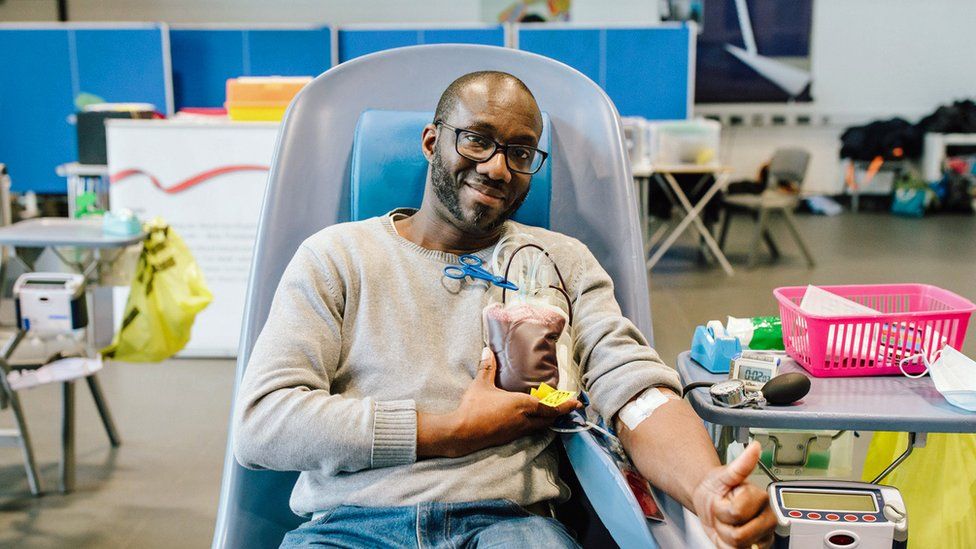ARTICLE AD BOX
 Image source, PA Media
Image source, PA Media
A record 250 blood donations are needed every day to treat sickle cell
By Andre Rhoden-Paul
BBC News
The NHS is urgently calling for black donors to give blood to help people with sickle cell disease as the demand for donations reaches record levels.
About 250 donations are needed every day to help treat the blood disorder.
But currently the blood donor service is only able to provide matched blood for just over half of the hospital requests.
Sickle cell mostly affects people of black heritage and ethnically-matched blood gives the best treatment.
The disease causes red blood cells to distort and become sticky, blocking vessels and restricting oxygen supply, which triggers excruciating pain. Many patients need regular blood transfusions to stay alive.
Five years ago, 150 donations a day were needed. Now that figure is at 250, with the demand projected to keep on rising.
NHS Blood and Transport said this was due to patients living longer and the increased use of complete blood transfusions, which had improved patient outcomes.
About 55% of black people have a Ro blood type, compared to 2% of the wider population.
It is clinically safe for patients to be treated with O negative - the universal blood type - but that can lead to complications in the long term.
Image source, Sadeh Graham
Image caption,Sadeh Graham requires regular transfusions
Sadeh Graham, from the West Midlands town of West Bromwich, needs all her blood replaced by donor blood every four weeks.
"Some days I struggle to get out of bed and have a shower due to the sheer pain in my limbs," she said.
"Some days I wake up feeling great, and some days I wake up in hospital, connected to machines and told that days have passed."
She credits the transfusions for saving her life "many times over".
What is sickle cell disease?
Image source, Getty Images
Image caption,People with sickle cell disease produce unusually shaped red blood cells
- It is inherited from both parents, who pass on a particular gene
- It is possible to carry the gene without having the disease
- Nearly 300 babies are born with it each year in the UK
- A simple blood test will show whether someone has it
- Children with sickle cell are at greater risk of a stroke
- Other symptoms can include serious infections, anaemia and tiredness
Source: Sickle Cell Society / NHS UK
The urgent call from the NHS Blood and Transport service comes as it launches a Black History Month campaign to highlight how black communities have the power to help treat sickle cell and provide life-changing blood donations.
Dr Rekha Anand, a consultant in transfusion medicine, said: "Matched blood is vital for sickle cell patients to reduce the risk of serious complications and black people are more likely to be able to donate matched blood.
"There has been a small rise in black people donating blood but we urgently need more to become regular donors.
"Giving blood is easy, quick and safe - and you will save and improve lives."
Professor Kevin Fenton, regional director for London for the Office for Health Improvement and Disparities, said: "Being able to provide high quality clinical care to sickle cell patients both saves and improves the quality of their lives and is an important step in helping tackle health inequalities."

 2 years ago
40
2 years ago
40








 English (US) ·
English (US) ·